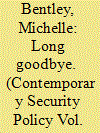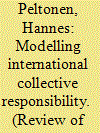|
|
|
Sort Order |
|
|
|
Items / Page
|
|
|
|
|
|
|
| Srl | Item |
| 1 |
ID:
151653


|
|
|
|
|
| Summary/Abstract |
This article asks when, how, and why states started to use the concept of international community in the shared language of diplomacy and international law. It argues that the concept was accepted to the interstate language as a result of debates over international institutions, which were to acquire a universal character, at the Hague Conferences of 1899 and 1907. The article suggests that conceptual changes in interstate language should be understood as products of rhetorical power struggles, in which some arguments lose the battle while others prevail, some concepts are discarded while others modified. The article suggests a model of conceptual change that explains an innovation in interstate language. First, it draws attention to collective assertive speech acts at diplomatic events that signal changes in international politics. Second, it examines whether such acts implicate conceptual innovations. Third, it posits that the composition of epistemic community assembled at the Hague determines the nature of conceptual innovation. Fourth, it demonstrates how rhetorical interventions into debates at the conference introduce and mould relevant concepts. Fifth, it illuminates how contextualisation of the conference interventions in professional debates helps us understand the polemical nature of arguments and the scope of conceptual innovation.
|
|
|
|
|
|
|
|
|
|
|
|
|
|
|
|
| 2 |
ID:
114827


|
|
|
|
|
| Publication |
2012.
|
| Summary/Abstract |
This article responds to an earlier article by Christian Enemark to reassess the concept of weapons of mass destruction (WMD). How is the concept defined and can it be removed from policy and academic discourse? Firstly, this paper contests the reduction of WMD to mean a fixed set of armaments (nuclear, biological, and chemical weapons). In contrast to this essentialist approach, it uses American archival and policy examples to demonstrate that the concept has been defined in a wide variety of ways, choices that reflect the strategic and contextualized intent of the actors. Secondly, this article questions the assertion that the quality of strategic thought and security policy would be improved if the concept were abandoned. While the conflation of diverse weapons under the umbrella of WMD is problematic, the political nature of the concept's construction means its elimination is not straightforward. Conceptual change cannot be imposed independently of the way meaning is politically constructed. While not disputing the serious problems associated with allowing the WMD concept to survive, this article concludes that the real question here is one of context. Failing to address why and how it is used leads to underestimation of how likely removal is within the current discursive climate. As long as that value remains - as long as WMD is an effective resource for policymakers to shape security policy - there is little chance of being able to abandon the WMD concept in the foreseeable future.
|
|
|
|
|
|
|
|
|
|
|
|
|
|
|
|
| 3 |
ID:
095600


|
|
|
|
|
| Publication |
2010.
|
| Summary/Abstract |
Since its popular appearance in 2001, the responsibility to protect has gained wide attention. Yet, the meaning of responsibility in the R2P report has remained unexamined. The first task of this article is to conceptualise responsibility as it seems to arise from the R2P report. It is argued that the responsibility in the report is collective in nature, and analogous to obligations erga omnes and collective responsibility to extinguish fires before the institutionalisation of fire departments. The second task is to provide a model of collective responsibility with criteria that allow dividing the burden of fulfilling the common responsibility among the members of the collective. The model bridges the conceptual level with the level of practice.
|
|
|
|
|
|
|
|
|
|
|
|
|
|
|
|
| 4 |
ID:
157744


|
|
|
|
|
| Summary/Abstract |
Starting in 2010, the Obama administration engaged in an effort to justify drone strikes relying on the concept of ‘imminence’. The aim of this article is to understand the reasons behind such insistence and to assess the administration’s efforts at conceptual change. Building on Skinner’s and Bentley’s work, the article argues that the administration has followed an ‘innovating ideologist’ strategy. The analysis shows how waves of criticisms exposed the administration to a key contradiction between its rhetoric of change that emphasised international law and the need for aggressive counterterrorism. Reacting to this criticism, the administration has relied on imminence due to its connection with legitimate uses of force, while working to change the criteria for the concept, causing a shift away from imminent as ‘immediate.’ Reassessing Skinner’s place in IR, the article identifies conceptual change as a lens to assess foreign policy rhetoric and practice. The analysis emphasises the connection between actors’ intentions, beliefs, and practices. It highlights the importance of criticism in engendering contradictions, exploring why only some criticisms are confronted. Finally, the article develops an original typology of the limits confronted by the innovating ideologist and methods to assess whether the actor has respected them.
|
|
|
|
|
|
|
|
|
|
|
|
|
|
|
|
|
|
|
|
|